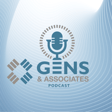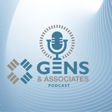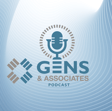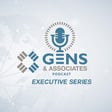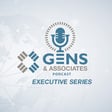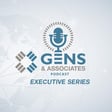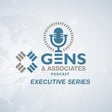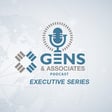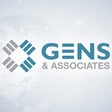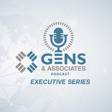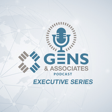Become a Creator today!Start creating today - Share your story with the world!
Start for free
00:00:00
00:00:01

Executive Series Episode #7 - Raoul Lorenz
In this Executive Series episode, host Steve Gens is joined by Raoul Lorenz (CEO of LORENZ) to discussThe critical Health Authority and Sponsor digital interchange, excellence in market performance over time, and future plans for LORENZ.
Transcript
Introduction to the Podcast and Guests
00:00:00
Speaker
Welcome to the Gens & Associates Executive Podcast Series. I'm your host, Steve Gens, managing partner of Gens & Associates. Today, I'm thrilled to have Raul Lorenz, CEO of Lorenz Life Sciences. So Raul, I'm very excited, looking forward to this podcast with you. There's a lot of great things going on at Lorenz that I'm sure our listeners are eager to hear.
00:00:24
Speaker
And more importantly, a very exciting user conference coming up next month in Berlin.
About Lorenz Life Sciences and Its Mission
00:00:30
Speaker
So before we get started, if you could give our audience, our listeners, a brief introduction of yourself and Lorenz Life Sciences.
00:00:40
Speaker
Sure, Steve. Yeah, thanks. ah Likewise, I'm looking forward to it. Thank you very much for the invitation. Very honored to be part of this this series. um Yeah, Raul Lorenz. I'm ah the CEO of Lorenz Life Sciences, as Steve has mentioned. I've been the CEO since 2006.
00:00:55
Speaker
But my history with the company goes back a little bit further, so I've actually joined the company in 1996. So it's been with that company for quite a while. And yeah and in essence, you know our company ah facilitates the digital exchange of data between sponsors and regulators in the life sciences space.
00:01:12
Speaker
And to do that, we focus on certain rim capabilities. you know Core to that is submission management, including submission review, product lifecycle management, product information, content management, technical validation. So a lot of the ah core capabilities that you'd also find in in your surveys as well.
00:01:29
Speaker
I think one one thing that ah is is perhaps quite an interesting little little anecdote is is the question of how we even got into this space. um And you know back in the early 90s, one of the things that some may remember is that you know submissions were not done electronically. they were not done um They weren't even done on digital media. um they They were actually done on paper.
00:01:53
Speaker
And I think the only electronic version that you got, I think, was back in the 80s. They were called Candace, Computer-Aided New Drug Applications, predominantly, as I mentioned, with the the at the FDA.
The Evolution of Submission Processes
00:02:07
Speaker
um But the FDA reviewer typically has several submissions to review. And every single solution that they use to review the submissions had its own hardware, proprietary hardware, and its own software. So you can imagine this poor FDA reviewer sitting at their desk with five or six different computer systems there. So that that clearly isn't something that is scalable. And our founder Wolfgang Witzel, who's the president today, he aimed to standardize this process. And you know he he didn't originally come from this industry, and he he actually sold a content management system to a large pharmaceutical company.
00:02:46
Speaker
And when they went live, he said, look, you know can I come by and and have a look at this? Can I see ah you know how it operates? And they said, sure, you know come by. And you've got to remember, this is the late 80s. So when we talk about computer technology, we're talking big screens, big scanners.
00:03:02
Speaker
Everything was big, very impressive hardware. So he arrived at the site and they showed him, look, here's our scanning station. Here's our indexing station. Look, this is you know where we store it. This is an example of how we retrieve the information. And the whole time there was some noise in another room adjacent to to the room he was in. And he asked,
00:03:21
Speaker
well but what's What's that noise that i hear in that room over there and they said well you know everything that we just scanned in we're actually printing back out over there. Why are you doing that he said well because the the agencies they want everything on paper and that really kick started this drive first of all the formation of this company but also the drive to actually.
00:03:43
Speaker
ah standardize electronic submissions, create a format, a standard that ultimately would help companies to adhere to. ah He just found it really incredible that you'd go through all the effort of scanning something in only to print it back out again. So sometimes it's funny how things start, but that was the start of this company anyway.
Lorenz's Market Presence and Success Factors
00:04:04
Speaker
Yeah, I think that's a ah lesson. There has to be a better way moment that he had and hear a very, very successful company. And you brought me back to my industry days in Johnson & Johnson, Janssen or Janssen specifically. And to build on the candel, I was rotated over to the Janssen Research Foundation. um More on the clinical operation side, because we're doing the first round of digitization of the ETMF and A bunch of these electronic files have to go over to the regulatory people. And I think the room next to where we had the scanning operation was these massive docutex that drew an incredible amount of paper, but could could print, print, and print. And then fast forward, are when I founded the company in 2005, our first survey,
00:04:55
Speaker
in 2007 was around enterprise content management, um but ECTD adoption. and you know Fast forward to where we are today with the digital exchange. it's so We always think we're moving too slow as um as an industry, but if we look at these you know kind of time bites, it's it's pretty amazing.
00:05:14
Speaker
So, um speaking of our benchmarks, as you know, we we started our first one in 2007, again, around enterprise content management and ECTD adoption. Some of the collaboration tools were just, you know, kind of coming online, but we always had the software provider section, which how we designed and crafted ah that is exactly how we do it today. We look at market share, customer satisfaction, and later in the mid-2000s, I think it was 15 or 16, we started.
00:05:50
Speaker
the innovation index. So what's been impressive for me for Lorenz life sciences, even from the inception, and there's been a lot of different regulatory providers, some have come and gone, some like yourselves, and maybe three or four others that have the, you know, have the 2025 30 year history, but what has always ah impressed me is that you know you've voiced on grade and market share, and it's actually increased quite a bit over the last four or five years. But for for us, we focus more on the customer satisfaction and index. And to have that consistent and strong throughout decades, just not years, really speaks to quality products, excellent service, and company culture. So could you share with our listeners how Lorenz keeps this high performance over time?
00:06:41
Speaker
ah so I think it's a difficult question to answer because you know you know there's probably not you know one aspect that that helps us with that particular achievement, but maybe there's two words that I'll use. One is focus and the other one is continuity. If I look at focus, I mean one of the things we've always said And we tell every potential new customer as well, you know we don't need to be everything to everyone. But what we do deliver better be the best that there is. And we've always, as a company, avoided to go into other industries. And you can argue that you know we have technology that can be applied in legal or financial industries as well. But we've avoided that. We said, we're always going to stay in the industry that that we can add most value to.
00:07:28
Speaker
And we've also avoided going to other disciplines within our industry. So, you know, very often we get asked, well, why don't you do, you know, submission outsourcing services? Why don't you do consulting services? Well, at the heart, we're an engineering company. And, you know, this is where we feel we can add most value. So, you know, this this focus ultimately also leads to really deep domain expertise, really across all parts of the company, ah you know even the executive level. At the end of the day, all of us on the executive, we all deeply care about know what our customers are doing with our solutions and also you know the concerns and the worries they have. you know yeah I say this often as well ah because some can believe that. But you know you know I, for example, get every two weeks a list of all support tickets that have not adhered to our own internal SLA or where a customer has scored it below a certain certain rating.
00:08:21
Speaker
you know I literally physically get those support tickets and we analyze you know why are you know why did they turn out the way they did. So this is a level of detail that we look into. So I think focus is... is certainly one aspect. And the continuity part, I think it kind of talks on to that. Because you can really only maintain this focus, especially in a time of consolidation, you know, this idea of one-stop shops, it becomes a luxury to be able to focus so much. And you kind of got to be in control of your own destiny. You have to be financially independent.
00:08:54
Speaker
And that allows us to invest into the long-term into people and opportunities. And this long-term thinking really gets embedded into the corporate culture. Everyone lives it and it attracts, at least for us, the right people that ultimately build and deliver the products that our customers are using today.
00:09:09
Speaker
And you really need this this ah you need this continuity to build the company the way we do. If you think about, you spoke about market share, you know you can go out and you can acquire ah customers through acquisitions. But what we've done historically is always grow organically. Ultimately, it means we need to build a better product.
00:09:29
Speaker
And that's something that's actually embedded in our in our mission statement, engineering the world's most desirable RIM solution. But that word, desirable, is for the end user. It's not for the corporate entity or the corporate customer. So we're more concerned and about the user That sits there sometimes at midnight, you know, because they have submission deadlines and they have to, you know, they have to use our software. They don't get a choice necessarily. So we want to build software that they would always choose over any other software product. And again, there are many parameters that we may not be able to influence. ah We understand that.
00:10:07
Speaker
But ultimately, we build for the end user. um it's not We don't build products to tick as many generic boxes as possible. And again, we realize it's a luxury. ah But that ultimately, again, you know focus and continuity, I think those are the two things that that I would highlight, and perhaps explains also the consistency in that sense that you mentioned.
00:10:27
Speaker
Yeah, and thanks for that. And what that brings up for me is is a statement of organizational resilience to kind of the other words that you chose and and just that history.
Complexities in Digital Exchanges
00:10:38
Speaker
But also, you know, for many of our listeners, many of them are sure and regulatory operations, they understand that last week before a major submission um where the clinical people want to make you know that last change, you know, after the deadline to the CSR or whatever the case may be.
00:10:56
Speaker
um it's It's extreme focus, I would say, for a lot of your customers to do what they do um every day. So let's move on to the next area. you You already talked about the digital exchange between sponsors and health authorities. And certainly, Lorenz is in a very unique position. And I would say from my chair, um as far as companies that do yours, it's less than the five fingers on on my hand.
00:11:24
Speaker
you know And it's easy to say the word digital exchange between sponsors and health authorities. The concept's very simple, ah but it's incredibly complex with the changing requirements, keeping up to date with them. But there's also, you know how do we how do we innovate on that? So I would imagine, because a lot of the software providers kind of in this space just work for the sponsors, but having the health authorities and the sponsors, this combination,
00:11:55
Speaker
um How does that enhance innovation for what Lorenz does from an innovation standpoint for for this large community?
00:12:05
Speaker
I think strategically for us, it's's it's it's very important. And I think, as you mentioned, it's quite unique. We we have 19 health authorities, amongst them the largest of them all, the US FDA, CEDAR and CBER, probably the largest in terms of volume and repositories that we'll we'll ever see. And we're also proud of the fact that you know just you know under 30% of the world population receive new medicines when approved electronically through our system. So there's there's quite a bit of volume that goes through our systems. but I think to answer your question, we kind of need to take a step backwards because our role at the authorities is not to supply an ECDD viewer. I think that that that's perhaps a too simple view on it. Our role is really to automate and integrate processes through standardization. And and taking that approach allows us to have a deeper conversation.
00:12:54
Speaker
And you know maybe I can give you two examples of of how also discussions with agencies lead leads to changes also for the industry. um The one thing that we're learning is you know what processes are being performed and why on both sides. So you know industry has certain steps that they go through, but agencies as well. And you begin to understand where one process stops and the other begins. And then you have to start thinking, well, can you get rid of some of these steps?
00:13:22
Speaker
And one such example is the PRISM initiative. I think that the FDA is spoken about quite a bit. It's driven by the US FDA, but also some industry participants. And in that, it's a research project. For example, we're looking at, is it possible to remove a validation step? So if the industry does a technical validation of their content before they submit it to the regulator, and the regulator then validates it again, the outcome theoretically should be identical.
00:13:52
Speaker
So how can you get rid of one of these steps? And that's what this PRISM initiative looks like, is looking at. And it goes, you know, one step further to see, you know, is it even possible to consider, well, if the content's been submitted, why do you have to move it again, right? So I think these kind of initiatives look to, you know, improve the overall efficiency of of the process. And that can ultimately lead to to changes also in how industry will function in the future. That's that's one such example.
00:14:21
Speaker
um The other one that is is more about understanding why regulators are actually requesting what they're requesting. I mean, if you talk to industry, ah sometimes, you know, there's a question why are they want wanting it this way and they're wanting it that way. um And what you when you look behind the scenes, you start to understand that processes ah behind you know the ah the submission gateway, so to speak. um you know you If you look behind those, you suddenly begin to understand why agencies need such something in a certain format, why sometimes it's a little bit different. You understand how companies collate their information, how agencies process it, and you know what they do with it.
00:15:02
Speaker
And the the thing that you see that probably people don't want to hear is but you probably find that there are several versions of the same content in format and structure. You have a corporate version that's continuously evolving and you don't even have an agency version because actually there could be different versions with different agencies. So if you have all these variances,
00:15:25
Speaker
How does that translate into software solutions? Well, it's process over format. And one of the things that we've always said is that our solutions are always format independent. ah And ah the solution essentially needs to deal in a transparent way with all these different variances on both sides, industry and agency. I know we have standards, but the reality is the way the standards are applied differs for very good reasons and with the various stakeholders.
00:15:52
Speaker
The advantage at the end, if you rethink you know that you know you you you have developed solutions in a more format, independent way, is the consequences that our customers will have it easier to move, for example, from EVMP to IDMP. They'll have it easier to move from ECD3 to EC4.
00:16:10
Speaker
it's the same yeah know It's the same process, even if the deliverables vary. And so again, I think this is again something that we've learned from the regulators and how they make use of what they receive. um that we need to the The way the system uses this information needs to be as flexible as possible. And and I think ultimately it's it's a benefit to the industry as well at the end of the day.
00:16:36
Speaker
Yeah, that's a significant amount of work and I am just getting
Upcoming Challenges and Future Directions
00:16:40
Speaker
educated. I i think just this year and really understanding the ah the prism initiative, but we're we're in the age of where can we simplify? We have such complex environments. So even with the ah the start of the the whole, we called it the decade of room modernization and that started around 2013 or 14.
00:17:00
Speaker
But what's so impressive about this conversation is you know most people in industry on the sponsor side, you know we have to look at end-to-end processes, we're looking at change control, by label variations, kind of the list goes on. ah But you know your team has a very different view of end-to-end from sponsor and deep into the health authority as As you're going kind of going through that story of the health authority and how it processes it, I wish, and you know, Greg Brolin, you know, on the the team very well, ex FDA 25 years, um I would always say ah Greg's role there because they developed all the first submission review systems to safety systems. It's the catcher's met, you know, with all the data, you know, coming in from, you know, industry on that. And I think a lot of people on the sponsor side
00:17:50
Speaker
don't appreciate what has to happen on the health authority side that you know you're you're you're submitting a submission which they might have gotten 70 or 100 you know different types of submissions from you know all different sponsors during that day too so it's highly complex and certainly impressed with the um And I think it's a necessity about the format independence. And as you're kind of going through this, I just hear that, you know, Lorenz engineering culture, you know, at work and maybe back to kind of where the company was founded, there has to be a better way, you know, and always searching, you know, how can we engineer something for a better way?
00:18:28
Speaker
So with that said, um um my last question, and there are so many great things happening at Lorenz, but you know as the ah CEO, what what excites you most about the organization and its customers in the near and longer term?
00:18:47
Speaker
you know the I mean, I spoke about our product mission earlier. Our product vision hasn't really changed. you know we We talk about reducing the transactional unit costs of complying with regulatory standards and exchanging regulated information. That's the vision we have. Ultimately, that's not changed. the The challenges vary. So every every cycle has its own own challenges. um And you know if I look at you know what are the the topics that we're looking at now, there's probably three things that are interesting.
00:19:15
Speaker
um um First one is agency collaboration. um I think also if you attend conferences, you will have seen topics such as reliance popping up over and over again. So we're looking at you know the different models that can exist ah to to enable agency collaboration. And remember, this is not necessarily always about technology.
00:19:37
Speaker
as Some agencies have legal frameworks in place so that they are able to work with each other. Others don't. You kind of have to find a a solution really that that fits depending on the scenario that that you that you encounter. And so in all of that, we see huge potential in reducing again this transactional unit costs for both sponsors and for the regulators, ultimately significantly benefiting the patient. So I think that's that's certainly one area that we're we're we're excited about.
00:20:07
Speaker
And another area, and I know no one wants to hear it, but ECD4, of course. you know This is about greater flexibility, and it's an evolution towards more data. And I know that there's a perception out there this will be a major cost driver for companies. I honestly don't don't see that, not for our customers anyway. It's just they just have to add an ECD4 publishing module, and off you go. um But I think that would be quite exciting. um and And another area, more of general nature,
00:20:37
Speaker
what we call internally standardized KPI development. So, and and Steve, you've done a lot of work on this. Looked at, you know, what are KPIs that our companies are looking at and essentially also our end users are expected to do more with the same or even less. And and so we kind of need to start thinking about, well, how can we measure that and how can we enable or help these end users? How can we change also our decision making process with the company when it comes to product development, product configuration, product delivery, that better aligns to you know some of the key KPIs that our customers either are tracking or should be tracking. And I think that's an exciting topic. And that's actually something that we'll be talking about at our user conference in September as well.
00:21:25
Speaker
Excellent. and And you know, the KPI metrics is dear to our heart. And we've done a lot of that work with the world class and actually iterating it as we speak. So it'll be great to talk about that further at the conference. And yeah, with the ECTD 4.0, I've decided to stay on the sidelines of this. It's kind of interesting conversation.
00:21:46
Speaker
on that so um yeah as we yeah you know close up it's just really kind of amazing I have a a deeper appreciation of the heritage at Lorenz Life Sciences from selling a document management system and seeing there has to be a better way for something else um to you know clearly a market leader over time so So very impressive.
Contact Information and Conclusion
00:22:11
Speaker
So our listeners some of our listeners might have a question or want to learn more about Lorenz Life Sciences. um How should they get a hold of you? Is it you know through the website on LinkedIn? What would you suggest? I mean, obviously, um you know obviously you can always get a hold of our company through the website. ah We also use LinkedIn quite a lot to communicate whatever it is we're doing. Also, if we have certain webinars, for example, that might be of interest. So that might be something interesting to follow.
00:22:38
Speaker
Quite frankly, also, if you want to get in touch with me, send me an email, rl at Lorenz.cc, so RomeoNima at Lorenz.cc. I'm always interested to engage. I mean, if there's one thing I've learned of being with this company for nearly 30 years, being the CEO of nearly 20 years, I mean, the one thing I've learned is that I still have plenty to learn. So I'm happy to engage. If anyone has any views on these topics, I'm interested to learn, interested to exchange information.
00:23:08
Speaker
Yeah, perfect. and And I know the times were together, I always, you know, enjoy the conversations, because I see you as a thought leader and and a CEO on that. So for our listeners, if you have any questions for, you know, Gens and Associates, just go to our website, or very, very active on LinkedIn, we have not only the regulatory executive podcast series, we have our latest ah world-class RIM or the different core team members of the research team go through their section and really provide the deep learning of what we learned and also our subject matter expert corner. So Raul, thanks again so much, really enjoyed the conversation and look forward to your conference, um conference in Berlin next month. Yep, look forward to seeing you there.
